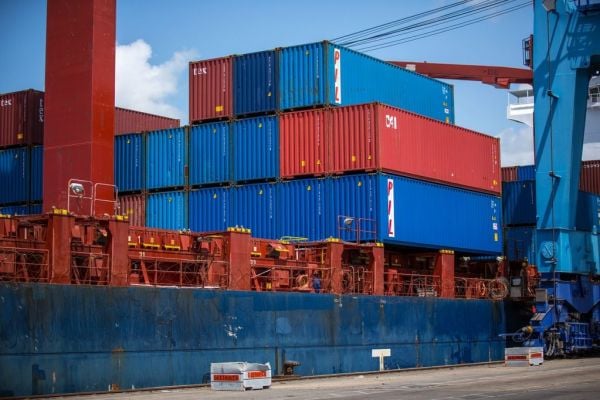Irwin Armstrong, a former chair of Boris Johnson's Conservative Party in Northern Ireland, has a simple message for the British Prime Minister when it comes to the province's unique post-Brexit trade rules: Don't ruin a good thing.
The founder of rapid test diagnostics maker CIGA Healthcare, who campaigned for Britain to leave the European Union six years ago, has described the so-called Northern Ireland Protocol as a game-changer for manufacturing businesses like his.
Under the protocol, part of Britain's withdrawal agreement from the EU, Northern Ireland effectively remained in the EU's single market for goods as the rest of the United Kingdom (UK) departed last year.
Since then, CIGA has won business from British exporters tied up in paperwork, expanded into new EU markets and doubled sales across the open border with EU-member Ireland.
'A Win-Win-Win Situation'
"My message to Boris Johnson on the protocol is 'sort out what needs to be sorted out and leave the rest alone'," Armstrong said at his Ballymena factory, calling the arrangements "a win-win-win situation".
The protocol is far from universally popular, however.
Its aim was to avoid a land border with the Irish Republic that many would see as contravening the spirit of a peace deal 24 years ago that ended three decades of violence between mainly Catholic nationalists seeking unity with Ireland and Protestant unionists wanting to remain part of the UK.
But the perception that, by placing an effective border in the Irish Sea, the protocol is eroding Northern Ireland's place in the UK has sparked anger among many pro-British unionists, which Britain says is also undermining the 1998 peace pact.
Johnson has pledged to do away with large swathes of the protocol within months if he cannot convince the EU to remove checks on goods moving into Northern Ireland from the rest of the UK.
Bureaucratic Hurdles
Northern Irish business groups have urged London not to act unilaterally, fearing the trade war it could unleash with the EU will take away the newfound competitive advantages firms such as Armstrong's enjoy.
They want both sides instead to agree to ease the checks affecting other more consumer-facing firms.
Pre-protocol it took Lynas Foodservice, a major supplier of food in Northern Ireland, seven days to order a product like mozzarella cheese from their usual British supplier.
Now it can take up to 14 and require eight different pieces of paperwork.
Longer lead times mean the Coleraine-based wholesaler has to hold more working capital - £11 million versus £10 million before. With British suppliers also charging more per pallet for the hassle at their end, costs are being passed on to retailers.
Lynas has stopped trading with 13 of the around 200 British suppliers it previously relied on, and is sourcing more goods from Ireland and shipping others through Dublin to avoid some of the bureaucratic trade hurdles.
"I'm okay in a business of 650 staff to add that cost and work with our customers but I think for a lot of smaller businesses it's definitely been more difficult," Managing Director Andrew Lynas said.
Two Speed Economy
Recent data showing that, alongside London, Northern Ireland is the only region in the UK where economic growth has surpassed pre-pandemic levels have led to some suggestions of a protocol-fuelled economic bounce.
Ulster Bank chief economist for Northern Ireland, Richard Ramsey, says it is not that straightforward as the economy went into the COVID-19 pandemic in a weaker state than the rest of the UK and benefited disproportionately from record government spending with one-in-four people employed in the public service.
"The protocol is presented as almost binary, it's either extremely good or it is terrible and needs to be done away with," Ramsey said. "The reality is there are good parts and there are a lot of grey areas which are still to be ironed out."
For now this has created a two-speed economy, he says, with sectors such as food manufacturing and pharmaceuticals booming at a time when economic surveys for May suggest the cost of living crisis is hitting Northern Ireland harder than most UK regions.
In the small town of Maghera, Crushing Screening Parts (CSP) owner Michael McGrath says the "good parts" of the protocol are directly responsible for a 32% year-on-year jump in revenues and plans to further add to his staff of eight.
Benefits
Glancing at a screen showing potential customers from Poland and Germany are browsing the CSP website, which emphasises the benefits of the protocol in capital letters, McGrath says he can deliver a part to them by the next morning while it can take a rival British supplier at least two to three days.
As a result, the proportion of sales the maker of spare parts for the quarry sector has going to the EU have more than trebled to 33%. For McGrath the solution to the protocol riddle lies in the famous words of Bill Clinton 30 years ago: "It's the economy stupid".
"For Northern Ireland to be successful, it's all about the economy," he said.
"The economy can really do well if the protocol is implemented correctly and to a level that we can all live with it."
News by Reuters, edited by Donna Ahern, Checkout. For more Supply Chain stories, click here. Click subscribe to sign up for the Checkout print edition.









